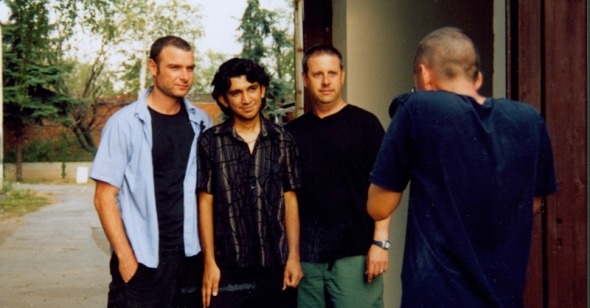Everything Is Deracinated
By Michael Koresky
Operation Filmmaker
By Nina Davenport, U.S., Icarus Films
Thanks to a steaming pile of liberal-minded good will, Muthana Mohmed, a 25-year-old aspiring filmmaker was brought from Baghdad to the Czech Republic to intern on the set of an American movie production. Muthana received the invitation after having been spotted in an MTV-produced documentary about youth in Iraq following the U.S. bombings and invasion; the makings for an inspiring true tale of determination, hope, and cross-cultural healing were all in place. Yet as charted in Nina Davenport’s provocative, utterly compelling documentary Operation Filmmaker, Muthana’s journey after leaving his homeland for the first time in his life was undone by factors reflective of an unbridgeable cultural divide. That more often than not Muthana’s failures are chalked up, by the film’s other principal figures, to flaws in his own character rather than the realities of contemporary geopolitics shows a fascinatingly muddied landscape of good intentions and woeful misunderstandings. At any given moment, Operation Filmmaker feels both refreshingly linear and enthrallingly multilayered: the subject, like the film, is difficult, charismatic, maddening, repellent, and sympathetic all at once.
Granted seemingly full access to Muthana once he arrives in the Czech Republic, Davenport must have thought she was documenting a hopeful tale of wartime survival, something about the boundary-breaking triumphs of art, with the added bonus of being a behind-the-scenes movie about movies. The results could have been akin to a laudatory DVD extra for Everything Is Illuminated, the Liev Schreiber–directed film Muthana was brought onboard for, yet instead Davenport follows the young man from enthusiasm to disillusionment to desperation, as he squanders the “opportunity to make friends,” refuses to take his trade seriously enough in the eyes of all the American go-getters surrounding him, and eventually seeks asylum from Iraq in the Czech Republic with the hopes of going to film school in England and America, all on the expected dime of those American filmmakers who first reached out to him. The stakes are high in Operation Filmmaker, yet Davenport’s editing is breezy, smart, and punchy, giving just enough information in every scene for us to properly navigate its incredibly fraught terrain.
Muthana becomes something of an annoyance to the Everything Is Illuminated crew, and ultimately a pariah to producer Marc Turtletaub, who grows to distrust the young man’s angling for help with cash and visa, especially in the face of perceived slacking off. Immediately disgruntled at his lowly laboring (after being tasked with making copies and filling snack cups, he huffs, “not my fucking job”), and then meeting with displeasure due to the results of his “gag reel” (a project entrusted to him for the wrap party), Muthana grows increasingly lonely and unmoored. Yet returning home is seemingly not much of an option either, as Muthana fears that some Iraqis might interpret his work on the film as complicity with the Americans, and even worse, Jewish Americans. Hardly the grateful Middle-Eastern assistant these good, upstanding antiwar Hollywood folk must have anticipated (when he tells Turtletaub that he loves George Bush, the producer’s disappointment is noticeable), Muthana is instead a three-dimensional, complex human being, perhaps not savvy but sincerely wedded to his own survival.
At one point early in the shoot, Davenport attempts to widen the scope of her project by sending cameras to Muthana’s friends back in Baghdad to document their daily lives, hopefully to provide eye-opening contrast to Muthana’s opportunities abroad. Yet as well integrated as these segments are into the film’s overall tapestry, Davenport ends up unknowingly initiating something even more radical, as she becomes increasingly involved in financially aiding Muthana. At the outset just a prompting offscreen voice, Davenport finally is one of Operation’s principal characters, in the end as unwitting a player as her protagonist, raising all sorts of ethical questions about the relationship between filmmaker and subject that she never could have predicted.
The convolutions people go through to rationalize their own agendas form the heart of Operation Filmmaker, which yearns for closure but finds in its seemingly innocuous central act of reaching out a fussy knot of unresolvable contemporary predicaments. Filmed following Saddam’s removal, and during Iraq’s first democratic elections and the Abu Ghraib scandals, Davenport’s film is an unlikely treasure trove of sociopolitical quandaries, with one aspiring young filmmaker at its center. One of the makers of Everything Is Illuminated says that they had hoped that Muthana would “take something away from the experience,” but what did they expect that to be? The “help me help you” attitude is here forged in a very specifically American brand of can-do that eludes Muthana and ultimately befuddles Davenport, whose brilliantly matter-of-fact film is testament to the seductions and limitations of film itself.
